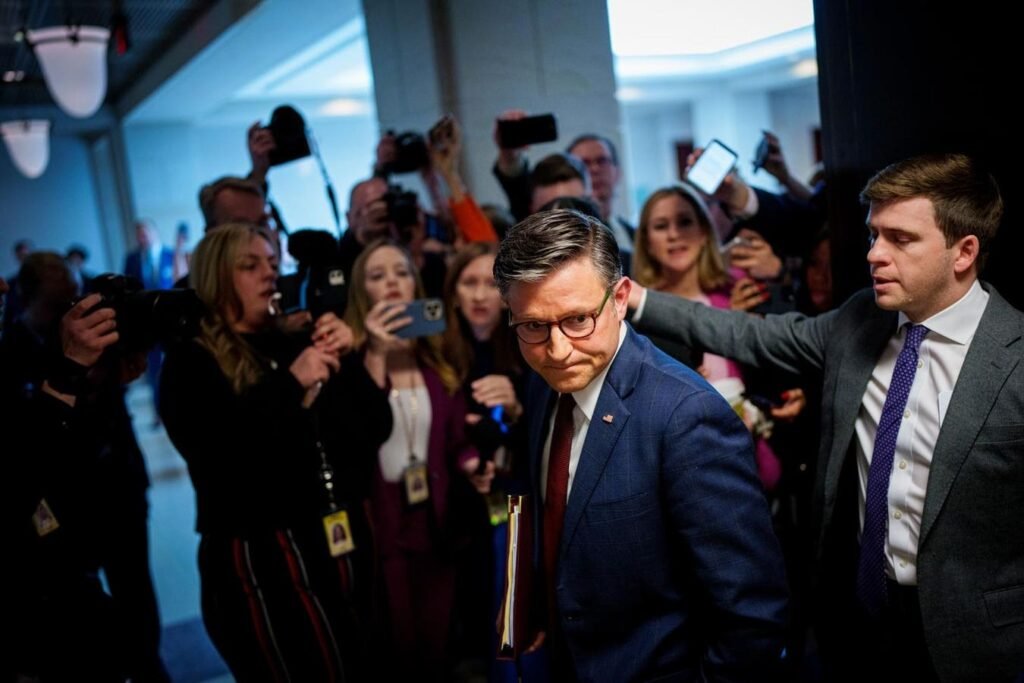WASHINGTON, DC – FEBRUARY 25: U.S. Speaker of the House Mike Johnson (R-LA) departs after speaking … More
Getty Images
House Republicans have proposed a $880 billion reduction to Medicaid funding over the next decade to help cover the cost of $4.5 trillion in tax breaks. If implemented, the cuts to Medicaid could have profound effects on public health for the millions of Americans that rely on its services. Here’s how.
Delayed Care And Less Access To Care
Medicaid currently provides health insurance for over 72 million Americans, which includes primarily low-income families, those with disabilities, children and pregnant females. The nonpartisan Congressional Budget Office estimates that at least 8.6 million Americans would lose health insurance over the next 10 years with the proposed changes to Medicaid. Without health insurance, Americans may delay emergent treatment for various health conditions and forego preventive care such as screening for cancer.
Early detection of conditions such as diabetes and cancer depend on regular screenings and health checkups, which are in jeopardy when people are uninsured. More individuals without health insurance means diseases could be diagnosed at late stages since individuals are less likely to seek care because they cannot afford it. Cancers that get diagnosed at more advanced stages are more likely to be deadly, thereby worsening health outcomes. As an example, the five year survival rate for breast cancer that is diagnosed at a localized stage is 99%, but drops to 32% for cancers that are distant-stage or advanced stage, according to the American Cancer Society.
Vulnerable Populations Will Suffer
Medicaid serves our most vulnerable citizens, which include children and seniors. This includes more than 37 million children, or nearly half of all children in the United States, that rely on Medicaid or the Children’s Health Insurance Program for health insurance. Cuts would directly impact pediatric care, such as potential access to developmental screenings, mental health services and even immunizations.
Immunizations against deadly infectious diseases has been a polarizing topic in America, particularly with respect to the measles outbreaks that have been occurring in America. To date, there have been over 1,000 reported cases of measles including two pediatric deaths, with both deaths occurring in unvaccinated individuals. Medicaid cuts could threaten millions of children receiving regular vaccinations, which could perpetuate the spread of infectious diseases and possibly preventable deaths, such as with measles.
Effects On Rural Health
Medicaid provides more than just individual health insurance; it is critical for the public health infrastructure in America. Medicaid funds 20% of the revenue of rural hospitals throughout America that serve 66 million Americans, according to American Federation of Teachers. In six states, more than 50% of children are covered by Medicaid.
A significant funding cut to Medicaid, as currently proposed, would force some of these facilities to downsize or shut down altogether, which would reduce capacity to manage public health threats such as infectious disease outbreaks or substance use epidemics. Rural hospitals and health play a pivotal role in providing high-quality health to the millions of Americans that rely on it, and funding cuts put this care at risk.
Effects On States
Medicaid is jointly funded by both the federal government and states. When states receive less federal funding for Medicaid, they may be forced to cut eligibility, reduce benefits or cut funds to competing priorities like education in order to provide healthcare. These hardships could amplify economic hardship for many Americans. Imagine families having to decide between paying for rent or filling their medications. This could be a reality for many if Medicaid cuts are fully implemented.
Threats To Health Equity
Medicaid cuts will also disproportionately affect people of color. Nearly a third (29.9%) of Hispanics get their healthcare from Medicaid and nearly 1 in 5 (18.5%) Black Americans do. These groups already face systemic barriers to healthcare access and are overrepresented among Medicaid recipients. Potential cuts to Medicaid could amplify existing health disparities making equity-centered public health progress more difficult to achieve.
Although proponents to the Medicaid cuts argue that there is profound waste and abuse with respect to Medicaid and that it needs to be reformed, the massive funding cuts will have important consequences for public health in America.


